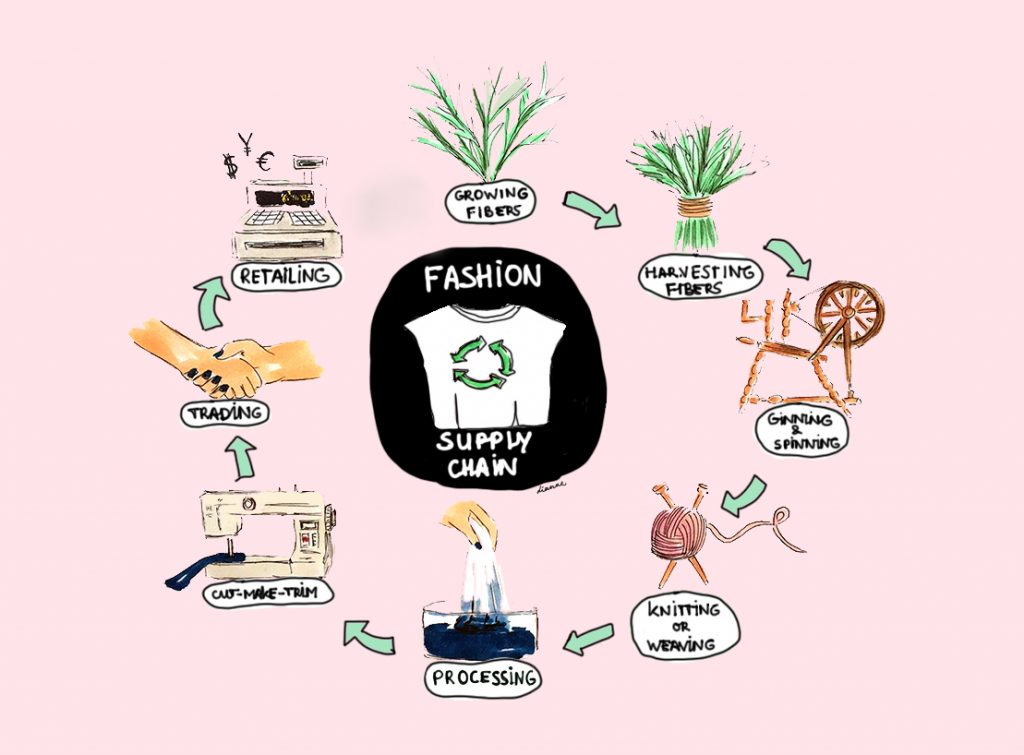people and planet before profits
Supply Chain Labour Exploitation
A supply chain is a series of processes, activities and a network of people that help to make and move a product from start to finish (consumption). Supply chains are often complex with various stages of production happening in different countries, controlled by different suppliers.

In simple terms, there is the supply (raw materials for manufacturing), manufacturing (building, assembling, converting, or furnishing raw materials into finished products), distribution (ensuring products reach consumers through organised networks of transporters, warehouses, and retailers) and consumption (the customers).
(Illustration by Lianne Middeldorp for MOCHNI, Art direction: Antonia Böhlke).
Here is a breakdown of the global supply chain for chocolate:
- Cocoa – West Africa, Central/South America, and parts of Asia.
- Nuts – worldwide (depending on the type of nut).
- Sugar – Brazil (primarily), India, and China
- Milk – United States.
- Corn Syrup – United States, Europe, Brazil, and Mexico.
- Vanilla – Madagascar, Indonesia, China, and Mexico.
- Aluminium Foil – West Indies, North America, and Australia.
Exploitation in Supply Chains:
At any point in the supply chain of a product, there is a risk of slavery being used. This means that the clothes we wear, foods we eat, technology we use – the goods and services we consume on a day-to-day basis could have been produced using forms of modern slavery.
With greater demand, businesses are always looking for cheaper sources of labour. There are over 16 million people exploited in the private sector, linked to the supply chains of the international businesses supplying our goods and services (Anti-Slavery International). Approximately 60% of forced labour is associated with manufacturing supply chains.
Additionally, supply chains can often be extensive and complex. This means that it is difficult for a business to oversee who is working where and under what conditions. Moreover, the globalisation of supply chains has added to the challenging nature of ensuring that suppliers are enforcing the same measures.
The agricultural, fast fashion and technological industries are at the highest risk of using forms of slavery in their supply chains.
Industry Profiles:
Governments Must Take Action:
Governments must introduce import controls on goods produced using forced labour.
This should increase supply chain transparency, will ensure that companies are held accountable, enforce appropriate sanctions and produce zero-tolerance policies to forced labour.
Governments must do more to take effective and coordinated action. Existing policies aimed at tackling forced labour in supply chains have been described as inefficient and ‘toothless’. We must do better – governments must act urgently.
Furthermore, governments must coordinate, internationally, to implement complementary policies to import controls. For example, mandatory human rights and environmental due diligence legislation to effectively tackle forced labour in global supply chains.
Policies should be directed at preventing the root causes enabling forced labour in the first place (poverty, gender inequality, worker discrimination, lack of worker representation and legal protection etc).
All of these measures to tackle forced labour need to be secured in trade agreement, legislative and development frameworks.
